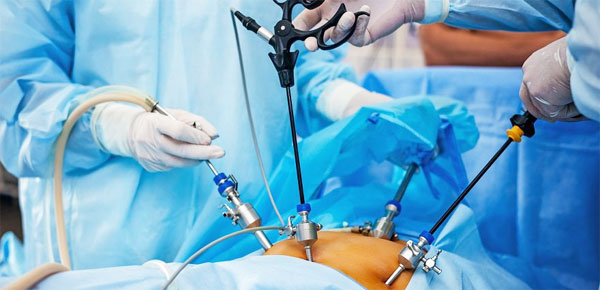Laparoscopic Gastrointestinal Surgery
What Is Laparoscopic Gastrointestinal Surgery?
Laparoscopic gastrointestinal surgery is performed by the surgeons in patients with gastrointestinal diseases. The doctor advises this surgery in case when the medicines cannot treat the patients or reduce their symptoms. Laparoscopic gastrointestinal surgery comes under the category of minimally invasive surgery.

What Are The Advantages Of Laparoscopic Gastrointestinal Surgeries Over Traditional Surgeries?
There are several advantages of Laparoscopic gastrointestinal surgery over the traditional surgery. Some of them are:
- Less pain: Patient who had undergone Laparoscopic gastrointestinal surgery feels less pain as compared to traditional surgery. This is because during the Laparoscopic gastrointestinal surgery, the surgeon makes very small incisions on the abdomen unlike the traditional surgery that requires a large incision.
- Fewer perioperative complications: The patients have fewer perioperative complications with Laparoscopic gastrointestinal surgery. Before the surgery, the surgeon informs the patients about the benefits of Laparoscopic gastrointestinal surgery. This will reduce the surgery-induced stress in the patients. During the surgery, there is low risk of bleeding and damage to other organs. After the surgery, the patient feels less pain and faster recovery. Thus, Laparoscopic gastrointestinal surgery offers advantage before, during and after the surgery.
- Less scar: During Laparoscopic gastrointestinal surgery, the surgeon makes very small incisions to visualize and perform surgery at the site. However, during traditional surgery, the surgeons make large incision. Thus, the patients have less visible scars after the recovery from the wound.
- Less bleeding risk: During the Laparoscopic gastrointestinal surgery, there is a low risk of bleeding due to minimal damage to the tissues. Thus, Laparoscopic gastrointestinal surgery offers less complications.
- Faster recovery: The patients have faster recovery with Laparoscopic gastrointestinal surgery as compared to traditional surgery. This is because of less tissue damage, low bleeding events, and less pain.
What Are The Various Diseases Treated With Laparoscopic Gastrointestinal Surgeries In Delhi?
Several hospitals in Delhi are capable of treating various diseases of gastrointestinal tract through Laparoscopic gastrointestinal surgery. Some of the diseases are:
- Colorectal cancer : Laparoscopic gastrointestinal surgery is now the preferred technique to treat colorectal cancers. All types of open colorectal surgeries are performed laparoscopically with equivalent/better results.
- Gallbladder stone and associated disorders : Laparoscopic surgery is the preferred treatment for these diseases. Today almost all of the gallbladder surgeries are being performed laparoscopically.
- Bariatric or weight loss surgery : These surgeries are performed laparoscopically with excellent results.
- Gastrointestinal cancers: With the growing experience the gastrointestinal cancers are being operated by minimally invasive methods. This includes cancer of esophagus (food pipe), stomach, liver, gallbladder, pancreas and small and large intestines.
- Crohn's disease : Crohn’s disease comes under the category of inflammatory bowel disease. In this disease, the patients have inflammation in their digestive system. Although the diseases may affect any area of the gastrointestinal system, the most common site for the inflammation are colon and small intestine.
- Diverticulitis : This disease develops in the wall of the colon. During this disease, there is a formation of the small pockets in the wall of the colon. These are known as diverticula. The patient may have bleeding (diverticular bleeding) or inflammation (diverticulitis) in the diverticula.
- Rectal prolapse : Rectal prolapse is the condition that occurs in rectum. Rectum is the part of gastrointestinal tract and during the rectal prolapse it protrudes out through the anus.
- Familial polyposis : This is an inherited condition. The patients with this condition have several precancerous colorectal polyps. It the condition is not treated at the polyp stage the patients may develop colon or rectal cancer.
- Colon polyps : Colon polyps are the cluster of cells that develops on the lining of the colon. While most of the colon polyps are benign, in some cases, they may have the potential to develop into cancerous tissue.
- Ulcerative colitis : The patients with ulcerative colitis suffer from ulcers and inflammation in the gastrointestinal tract.
What Are The Various Gastrointestinal Suregeries Performed Through Laparoscopy In Delhi?
Several hospitals in Delhi have the required infrastructure to perform various laparoscopic gastrointestinal surgeries. Some of the surgeries are:
- Appendectomy : The doctor, through this surgery, removes the appendix when it is inflamed or infected.
- Bariatric Surgery : Bariatric surgery is performed to remove the excessive fat from the abdominal area. This helps in weight loss. There are several types of bariatric surgery.
- Adrenalectomy : This type of surgery is performed to remove the excessive growth over the adrenal gland. Adrenal glands are present over the kidneys.
- Colon and Rectal Surgery : Several diseases of the colon and rectum, such as colorectal cancer and colon polyps, are treated through the laparoscopic surgery.
- Nissen : The surgeons perform this type of surgery to treat the gastroesophageal reflux.
- Cholecystectomy : When the gall stones in gall bladder are not managed with the medicines, the doctor performs this surgery to remove the gall bladder.
- Foregut Surgery : This type of laparoscopic surgery involves the treatment of diseases related to upper gastrointestinal tract, such as esophagus and stomach.
- Pancreatic Surgery: The doctor performs pancreatic surgery either to remove a part or the complete pancreas.
- Hiatal Hernia Repair : In this condition, there is an opening in the muscles between the chest and abdomen (diaphragm). The patient may experience shortness of breath, discomfort, and heartburn.
- Splenectomy : Through this surgery, the doctor removes the diseased spleen.
How The Doctor Performs Gastrointestinal Surgery Thorugh Laparoscopy?
During laparoscopic gastrointestinal surgery, the doctor makes a small incision into your abdominal cavity. The doctor them inserts a thin long tube with a camera at the other end (laparoscope) to explore the site of surgery. The doctor then makes another small incision to insert the surgical instruments. With the help of surgical instruments and assisted by camera, the doctor performs the surgery.
How Should I Prepare For Laparoscopic Gastrointestinal Surgery?
You should follow all the instructions of your doctor prior to surgery. The doctor may advise you not to eat or drink few hours before the surgery. Inform the doctor about the medicines you are taking. Your doctor may advise you to discontinue certain medicines before the surgery. On the day of surgery, you may undergo comprehensive health examination to determine your eligibility to undergo surgery.
What Are The Complications Of The Surgery?
As compared to the traditional surgery, the laparoscopic surgery has significantly low risk of complications. However, there may be complications such as infection, bleeding, pain after the surgery, and damage to other organs.
Tag = Laparoscopic Gastrointestinal Surgery in Delhi, GI Surgeon in Delhi
For more information = https://www.gastrodelhi.com/
- What are the causes of pancratic diseases?
- Gallstones treatment and gallbladder stone surgery in delhi at gastrodelhi
- What are the various diseases treated with laparoscopic colorectal surgery in delhi?
- Dr. neeraj goel is the best cancer surgeon in delhi, india
- Robotic surgery in delhi by dr. neeraj goel at gastrodelhi
- Cancer surgeon in delhi - dr. neeraj goel at gastrodelhi
- Dr. neeraj goel, cancer surgeon in delhi at gastrodelhi
- Cancer surgeon in delhi, dr. neeraj goel, and gi surgeon in delhi | gastrodelhi
- How the doctor performs robotic surgery in delhi? | robotic surgery in delhi
- What are the various types of robotic surgeries available in delhi? - robotic surgery in delhi | gastrodelhi

 Comments (
Comments ( Category (
Category ( Views (
Views (